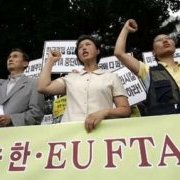- Negotiations

In May 2007, the European Union and South Korea started negotiating a bilateral free trade agreement. It took effect on 1 July 2011.
This deal is part of the EU’s post-2006 "Global Europe" strategy to boost the competitiveness of EU corporations in the world by securing deeper commitments to neoliberal policies from trading partners, including expanded rights for European transnationals. In Korea, the European Union is trying to win equal, if not better, footing against US firms after the conclusion of the US-Korea FTA. (The EU makes stronger demands than the US on Korea in the areas of intellectual property, services, competition policy and environmental standards.)
Social movements from both sides mobilised against the deal’s potential impacts. One flashpoint of concern is for Korea’s agricultural sector, where pig farmers in particular are expected to suffer from an influx of subsidised EU pork as a result of this deal.
last update: May 2012
photo: European External Action Service - EEAS/CC BY-NC-ND 2.0
14-Sep-2007
Yonhap
South Korean officials say they hope to reach a deal by the end of this year.
27-Aug-2007
Chosun Ilbo
It will specify when and how much Korea is willing to open its agricultural sector, the most sensitive area in free trade talks.
25-Jul-2007
BUSINESSEUROPE would like to see an agreement based on full coverage, full reciprocity and effective market access for industrial goods, ambitious services liberalisation of as many sectors as possible, strong rules to foster and protect investments, and strong rules on trade facilitation, competition and public procurement.
23-Jul-2007
Asia Pulse
The EU claims there are considerable gaps between what Seoul is offering Brussels and what was agreed upon with Washington
21-Jul-2007
Chosun Ilbo
Already, the EU has shunned Korea’s request to include goods made in the inter-Korean industrial park in North Korea’s border city of Kaeseong in their potential FTA and requested Korea to introduce a system in which cafes and restaurants pay royalties to music producers and performers.
19-Jul-2007
With the European Union and South Korea starting their talks on a proposed free trade agreement (FTA) in Brussels, Korean negotiators remain divided over how to open the country’s market to one of the world’s largest economic blocks. The cacophony represents the fact that the government has not put in enough effort to gather consensus before negotiations began and only pushes for the conclusion of the economic deal in a hasty way.
17-Jul-2007
South Korea and the European Union are struggling to narrow differences on tariffs and safety regulations on automobile trade as they try to forge an ambitious free trade agreement, a top South Korean negotiator said Tuesday.
17-Jul-2007
Monsters and critics
’We are setting the bar very high with a 100-per-cent trade liberalization offer,’ an EU trade official told Deutsche Presse-Agentur as European and South Korean officials opened a second round of negotiations in Brussels.
16-Jul-2007
Chosun Ilbo
South Korea has sent a draft proposal on free trade talks to the EU, promising to remove or phase out import tariffs on cars over seven years. Seoul has also decided to exclude rice from its list of markets subject to opening, but it may agree to open up its agricultural market, including beef.
12-Jul-2007
Chosun Ilbo
Korea’s chief envoy to free trade talks with the European Union is cautioning against being overly optimistic about having products made at an industrial park in North Korea’s Kaeseong included in the bilateral trade deal.






